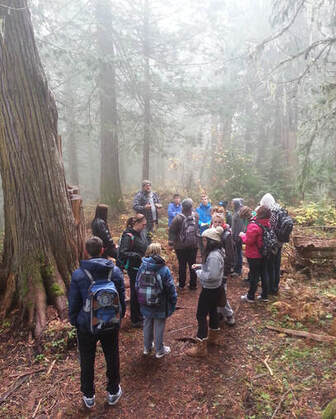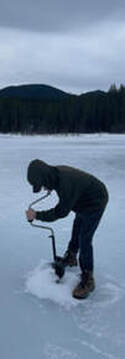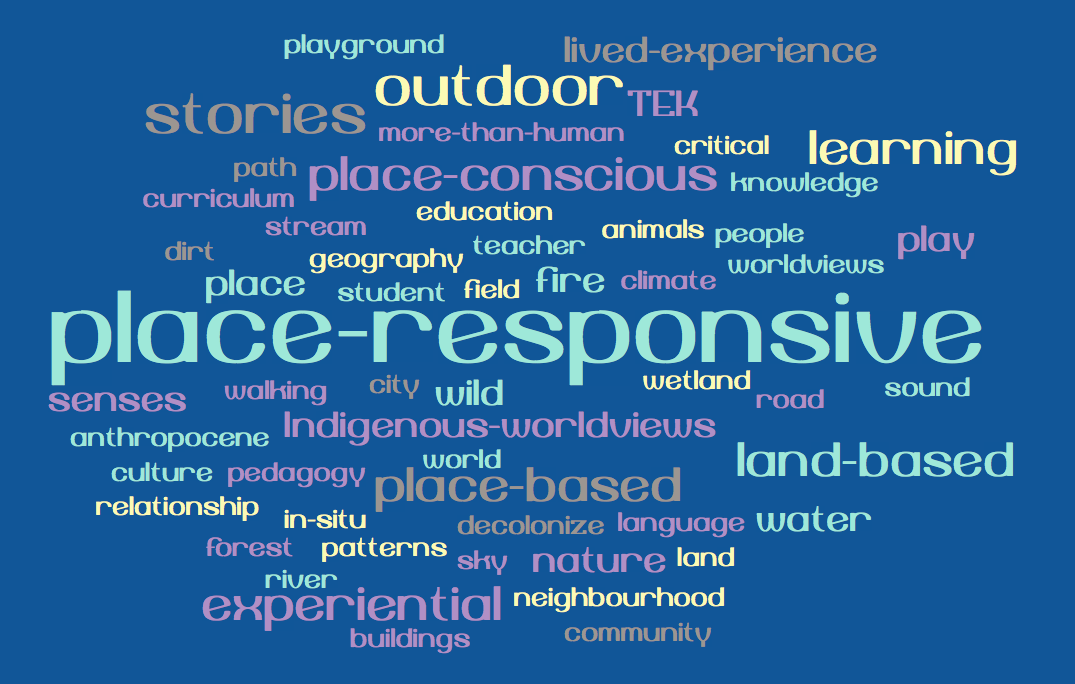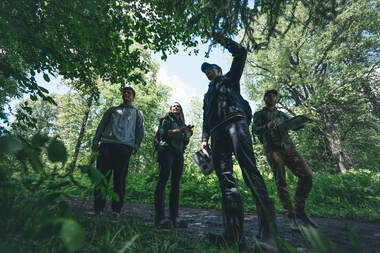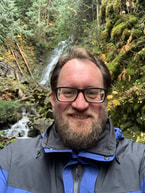Possibilities of place: Tracing the roots of place-responsive K-12 educator practice in North Central BCWelcome! Come on in! This research study is being conducted by Glen Thielmann, PhD candidate, towards the completion of a doctoral degree in the Natural Resources and Environmental Studies Program at the University of Northern BC.
Project OverviewThe focus of this study is to explore how, why, and where K-12 educator practices develop around place-responsive learning. The first part of the study involves gathering stories of place-responsive practice from educators, and the second part involves focus groups that make sense of these stories. There is also an option for a follow-up interview. Please continue reading below for all of the details related to this study. If you are interested in submitting a story and/or joining a focus group, please click the button below to provide consent and get involved.
|
Place Matters
We know this on many levels, from our connections to the people, places, and lands in which we dwell, ordinary and extraordinary, and the on-again, off-again relationship that we have with the more-than-human world. Our longing for nature has deep roots in the childhood magic we experienced while playing in the water, hiding behind trees, listening to the crunch of our boots in fresh snow, or watching bugs scatter from under a turned stone. Human places have also caught our imagination... a cabin, a dock, a barn, the perfect café. Maybe we remember our first time in the big city, crossing a river on an impossibly long bridge, or staring up at skyscrapers. In light of the converging environmental crises we face, and the call from the earth itself for a more sustainable relationship with us, it is also an imperative connection, and on the minds of many educators.
Place-responsive practices are closely tied to outdoor learning, nature play, land-based teachings, Indigenous perspectives, and education outside the classroom. These practices are not new, but are being taken up with such enthusiasm in BC that we should really know how they are rooted in lived experience of educators and pedagogies of place. We should also learn about the soil – the conditions in which these practices flourish and the challenges, the risks and rewards that place-responsive educators encounter, and the dynamics of practice that emerge as educators respond to place with their students.
This study will no doubt attract educators who engage in land-based learning, field experiences, immersion in nature, and other forms of outdoor education, but there are many other places outside the classroom that form special bonds and opportunities for learning. Place-responsive is simply another way to describe place-based activities that are highly conscious of the location, willing to respond to or learn from the place. More details about these concepts can be found under the Resources tab.
Place-responsive practices are closely tied to outdoor learning, nature play, land-based teachings, Indigenous perspectives, and education outside the classroom. These practices are not new, but are being taken up with such enthusiasm in BC that we should really know how they are rooted in lived experience of educators and pedagogies of place. We should also learn about the soil – the conditions in which these practices flourish and the challenges, the risks and rewards that place-responsive educators encounter, and the dynamics of practice that emerge as educators respond to place with their students.
This study will no doubt attract educators who engage in land-based learning, field experiences, immersion in nature, and other forms of outdoor education, but there are many other places outside the classroom that form special bonds and opportunities for learning. Place-responsive is simply another way to describe place-based activities that are highly conscious of the location, willing to respond to or learn from the place. More details about these concepts can be found under the Resources tab.
Who is conducting the research study?Glen Thielmann, PhD candidate
Natural Resources and Environmental Studies Program University of Northern British Columbia Prince George BC V2N 4Z9 Email: [email protected] Phone: 778.349.7978 PhD Supervisor: Dr. Catherine Nolin Email: [email protected] Phone: 250-960-5875 This research project is being conducted to fulfill the requirements of a PhD and will be part of a doctoral dissertation (public document). This research project is supported in part by funding by the Social Sciences and Humanities Research Council. See the Acknowledgements page for land acknowledgement, cultural safety statement, and researcher background. |
Elementary student on a class trip to
Shane Lake, augering a hole for ice-fishing. Photo: Glen Thielmann, 2021 |
What is the purpose of the research project?
What will happen in the project?K-12 Educator participants will be recruited through participating School Districts, the BC Environmental Educators Provincial Specialist Association, the UNBC School of Education, and the BC Retired Teachers' Association (approval pending) via announcements online and through School District or organizational channels. Stories will be gathered from educators from around BC, and then used to guide sensemaking activities by educators in North Central BC (area served by School Districts 27, 28, 57, 91). The researcher is using a methodology known as Participatory Narrative Inquiry, a way for groups to make sense and derive meaning from their own lived experience and those of others as expressed through stories.
|
Who can participate in the research project?
You are invited to participate in the first part of the study if your work as an educator in any capacity engages K-12 students anywhere in BC with place, land, outdoor spaces, or physical environments outside of the typical classroom. You do not need to be an expert in place-responsive education – simple interest in the project is enough, and some experience taking students out of the classroom in the past or present. Employment with a school district is not a requirement for participation. The second and third parts of the study are only open to educators from North Central BC – this includes pre-service teachers, active educators, and recently retired educators (within 5 years).
How to get involved in the research project
There are three ways in which to participate in the research study: 1) submitting stories; 2) joining a focus group; or 3) taking part in an interview about a particular program. Educators that consent to submit a story do not need to join a focus group, and those that join a focus group do not need to submit a story. All parts of the study are optional and participants can withdraw from the study at any time.
Part One: Story Gathering
Participants from anywhere in BC, and especially in North Central BC, will be asked to submit stories of teaching practice that demonstrate or reflect on their engagement with place. Participants who submit stories may choose to remain anonymous or may opt to provide a short biography to provide connection and context for their stories. The research project website will guide participants through the story criteria and submission process. Most stories will be short, requiring an hour or less to compose and submit. Participants that submit stories will receive a $10 gift card to a coffee shop or bookstore. Participants can submit a story without joining a Sensemaking focus group, or join a focus group without submitting a story.
Part Two: Sensemaking Focus Groups
Educators from North Central BC – the area served by School Districts 27, 28, 57, and 91, will be invited to participate in one of six focus group where we will spend time making meaning from the stories gathered in Part One in response to a variety of discussion prompts. These two-three hour group sessions will take place in local communities and will include food, door prizes (books or resources), and mileage reimbursement if coming from outside the community. At this stage, the planning is for these sessions to take place in Vanderhoof and/or Fort St. James, Mackenzie, Prince George, Quesnel, McBride or Valemount, and Williams Lake in Spring or Fall 2024. Focus group participants will receive a $15 gift card to a coffee shop or bookstore. Approximately a month after each focus group session, I will invite the focus group participants to join a virtual 60-minute meeting (Zoom platform) to review the notes I have gathered, compiled, and summarized from the field notes from their session. This is an opportunity to point out anything that might have been missed or misrepresented in my summary. This extra review step is completely optional.
Part Three: Vignette Interviews
Interviews will be conducted with 3-5 individuals or groups who have developed place-responsive programs in School Districts 27, 28, 57, or 91. The information from the interviews will be used to build a vignette or snapshot of place-responsive practices, lived experience of educators, and dynamics of practice within the program. Alternately, individuals or groups can submit a written description of their program, and we can interact about what the final vignette will look like. Interviews or vignette submissions will occur in 2023 and will typically take two hours to complete. Participants in these interviews will receive a $15 gift card to a coffee shop or bookstore and a book or resource from the Outdoor Learning Store.
Part One: Story Gathering
Participants from anywhere in BC, and especially in North Central BC, will be asked to submit stories of teaching practice that demonstrate or reflect on their engagement with place. Participants who submit stories may choose to remain anonymous or may opt to provide a short biography to provide connection and context for their stories. The research project website will guide participants through the story criteria and submission process. Most stories will be short, requiring an hour or less to compose and submit. Participants that submit stories will receive a $10 gift card to a coffee shop or bookstore. Participants can submit a story without joining a Sensemaking focus group, or join a focus group without submitting a story.
Part Two: Sensemaking Focus Groups
Educators from North Central BC – the area served by School Districts 27, 28, 57, and 91, will be invited to participate in one of six focus group where we will spend time making meaning from the stories gathered in Part One in response to a variety of discussion prompts. These two-three hour group sessions will take place in local communities and will include food, door prizes (books or resources), and mileage reimbursement if coming from outside the community. At this stage, the planning is for these sessions to take place in Vanderhoof and/or Fort St. James, Mackenzie, Prince George, Quesnel, McBride or Valemount, and Williams Lake in Spring or Fall 2024. Focus group participants will receive a $15 gift card to a coffee shop or bookstore. Approximately a month after each focus group session, I will invite the focus group participants to join a virtual 60-minute meeting (Zoom platform) to review the notes I have gathered, compiled, and summarized from the field notes from their session. This is an opportunity to point out anything that might have been missed or misrepresented in my summary. This extra review step is completely optional.
Part Three: Vignette Interviews
Interviews will be conducted with 3-5 individuals or groups who have developed place-responsive programs in School Districts 27, 28, 57, or 91. The information from the interviews will be used to build a vignette or snapshot of place-responsive practices, lived experience of educators, and dynamics of practice within the program. Alternately, individuals or groups can submit a written description of their program, and we can interact about what the final vignette will look like. Interviews or vignette submissions will occur in 2023 and will typically take two hours to complete. Participants in these interviews will receive a $15 gift card to a coffee shop or bookstore and a book or resource from the Outdoor Learning Store.
What are some benefits to participating in the project?
This research may benefit participants who submit stories by providing an opportunity to reflect on practice and gain access to the research results; it is hoped that this may provide a theoretical backing for their place-responsive work as well as quality resources for place-responsive education. This research may benefit the sensemaking focus group participants by offering connections to other place-responsive educators, and opportunities to express and deepen their own understanding of their work. This research may also benefit other educational stakeholders such as curriculum leaders and teacher education programs with recommendations relevant to their work and insight into the nature and possibilities of place-responsive practices.
Are there any risks to participating in the project?
There are no anticipated risks or discomforts related to this research. It is considered low-risk research and will be low-risk in terms of physical, psychological, social, cultural, and legal risks. However, if any participant wishes to access counselling or mental health services for any reason connected to this research, the following services are available free of charge:
- For employees of SD27 Cariboo-Chilcotin and SD91 Nechako Lakes – BCI Consulting: https://www.browncrawshaw.com
- For employees of SD28 Quesnel – WorkHealthLife: https://www.workhealthlife.com
- For employees of SD57 Prince George: Walmsley and Associates: https://www.walmsley.ca/login.html
- For others in Northern BC – Crisis Prevention, Intervention, and Information Centre: https://crisis-centre.ca
- For all of BC – contacts for virtual mental health supports, including culturally responsive services: https://www2.gov.bc.ca/gov/content/health/managing-your-health/mental-health-substance-use/virtual-mental-health-supports
Study Results
Participants can indicate in the consent form if they wish to receive a copy of my research when it is complete. The results from this research will be presented on this site and in writing via my doctoral dissertation and likely in journals read by educators and geographers in order to help them better understand aspects of place-responsive pedagogy. Maybe there will be a book! Participants can withdraw from this study at any time with no consequences.
Confidentiality, Anonymity, and Data Storage
Part One: Stories - data management
Participants who submit stories may remain anonymous at their request, and have any identifying elements in their stories removed. However, educator identity is a key part of this research project and participants may want to identify themselves as the authors of the stories as this will provide a context for the educators who will engage in the sensemaking focus groups. If authors decide to provide a short biography, they can choose what to include and what not to include, e.g., name, location of teaching, and background information. Regardless of whether authors choose to identify themselves, each submitted story will be assigned a number upon submission, so that their stories can be removed from the study if participants decides to withdraw from the study, in which case their stories will be securely deleted and any hard copies shredded.
Part Two: Sensemaking - data management
Participants in the focus groups will collectively discuss and make notes as they make sense of educator stories. Their individual responses will be coded with a number and remain anonymous in any collation of responses or field notes, and they will not be identified in the dissertation, unless a participant has specifically requested that their name be associated with their responses. If the participant decides to withdraw from the study, any data tagged with their assigned number can be removed and disposed of securely – shredded or securely deleted. Due to the nature of focus groups, I am unable to assure anonymity; however, I am requesting of everyone who participates that they respect the privacy of others and the project, and not communicate about their participation. With this measure, I am still unable to ensure full anonymity. The optional follow-up Zoom call will be recorded without participant windows included, just the researcher window, the shared screen, which will included a Word file with the researcher’s notes taken during the meeting, and the audio.
Part Three: Vignettes - data management
Vignette interview participants will be audio recorded in order to provide transcription and field notes. While there is no requirement to use names, the interviews are about programs which are identifiable, therefore I am unable to assure anonymity; however, I am requesting of everyone who participates that they respect the privacy of others and the project, and not communicate about their participation.
All participant responses will be accessible to the researcher (myself) and the individual respondents at their request. For example, participants who submit stories can get a copy back by supplying the story number they were assigned upon submission; similarly, focus group participants can ask to see any research notes or data that are tagged with their individual participant number. Each focus groups will also be invited to a follow-up Zoom session where I will show them the summary of research notes from their focus group section to check for accuracy and clarify any inclusions that are unclear. This is known as the Return Phase in Participatory Narrative Inquiry. Anonymized participant responses may also be seen by my supervisory committee if they ask to see them. If I invite any other colleague to offer advice on my research, I may also show them anonymized data with an understanding of that this information will remain confidential.
The research information gathered from participants will be stored confidentially in a) a locked filing cabinet in my office at UNBC for paper-based data, or b) in an encrypted FIPPA-compliant drive for digital data (current default for this at UNBC is SharePoint). The data will be shredded or securely deleted within five years of the completion of my dissertation. If this research data will be used from any subsequent research project, e.g. further analysis or celebration of educator’s stories who have identified themselves, I will seek their permission to use that data for any further purposes.
Participants who submit stories may remain anonymous at their request, and have any identifying elements in their stories removed. However, educator identity is a key part of this research project and participants may want to identify themselves as the authors of the stories as this will provide a context for the educators who will engage in the sensemaking focus groups. If authors decide to provide a short biography, they can choose what to include and what not to include, e.g., name, location of teaching, and background information. Regardless of whether authors choose to identify themselves, each submitted story will be assigned a number upon submission, so that their stories can be removed from the study if participants decides to withdraw from the study, in which case their stories will be securely deleted and any hard copies shredded.
Part Two: Sensemaking - data management
Participants in the focus groups will collectively discuss and make notes as they make sense of educator stories. Their individual responses will be coded with a number and remain anonymous in any collation of responses or field notes, and they will not be identified in the dissertation, unless a participant has specifically requested that their name be associated with their responses. If the participant decides to withdraw from the study, any data tagged with their assigned number can be removed and disposed of securely – shredded or securely deleted. Due to the nature of focus groups, I am unable to assure anonymity; however, I am requesting of everyone who participates that they respect the privacy of others and the project, and not communicate about their participation. With this measure, I am still unable to ensure full anonymity. The optional follow-up Zoom call will be recorded without participant windows included, just the researcher window, the shared screen, which will included a Word file with the researcher’s notes taken during the meeting, and the audio.
Part Three: Vignettes - data management
Vignette interview participants will be audio recorded in order to provide transcription and field notes. While there is no requirement to use names, the interviews are about programs which are identifiable, therefore I am unable to assure anonymity; however, I am requesting of everyone who participates that they respect the privacy of others and the project, and not communicate about their participation.
All participant responses will be accessible to the researcher (myself) and the individual respondents at their request. For example, participants who submit stories can get a copy back by supplying the story number they were assigned upon submission; similarly, focus group participants can ask to see any research notes or data that are tagged with their individual participant number. Each focus groups will also be invited to a follow-up Zoom session where I will show them the summary of research notes from their focus group section to check for accuracy and clarify any inclusions that are unclear. This is known as the Return Phase in Participatory Narrative Inquiry. Anonymized participant responses may also be seen by my supervisory committee if they ask to see them. If I invite any other colleague to offer advice on my research, I may also show them anonymized data with an understanding of that this information will remain confidential.
The research information gathered from participants will be stored confidentially in a) a locked filing cabinet in my office at UNBC for paper-based data, or b) in an encrypted FIPPA-compliant drive for digital data (current default for this at UNBC is SharePoint). The data will be shredded or securely deleted within five years of the completion of my dissertation. If this research data will be used from any subsequent research project, e.g. further analysis or celebration of educator’s stories who have identified themselves, I will seek their permission to use that data for any further purposes.
Questions, concerns, or complaints about the research projectIn case of any questions, please contact me and my supervisor directly:
Glen Thielmann (PhD candidate) – [email protected] or 778-349-7978 or by using the contact form Dr. Catherine Nolin (supervisor) – [email protected] or 250-960-5875 Any concerns or complaints about the research project should be directed to the UNBC Office of Research – [email protected] or 250.960.5852 |
Joining and providing consent to participate in the research project
You can join this research study with the online form link below (or at the top of the page) that highlights the information on this webpage and provides the opportunity for consent to participate in one or more parts of this research study. This will enable the opportunity to submit a story for participants in Part One of the project, and opportunities to be notified about participating in Part Two and Part Three of the project.
If you would like a copy of the information letter or consent form to preview before you decide if you'd like to participate, it can also be found in this document: participant_information_letter_and_consent_form.pdf
If you would like a copy of the information letter or consent form to preview before you decide if you'd like to participate, it can also be found in this document: participant_information_letter_and_consent_form.pdf
Do you want to help promote the research study? Feel free to share the recruitment poster (pdf).
